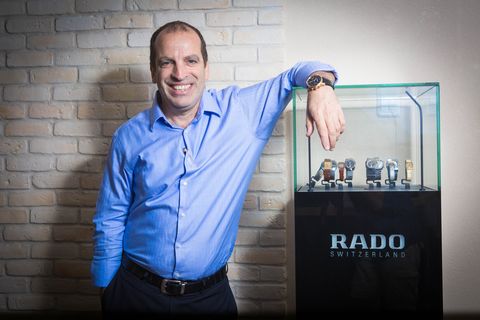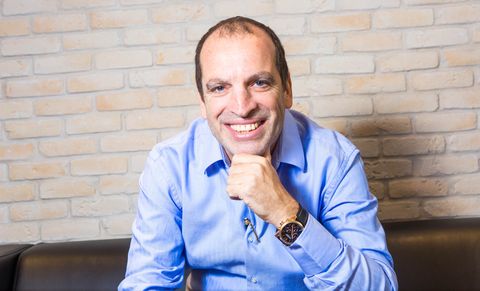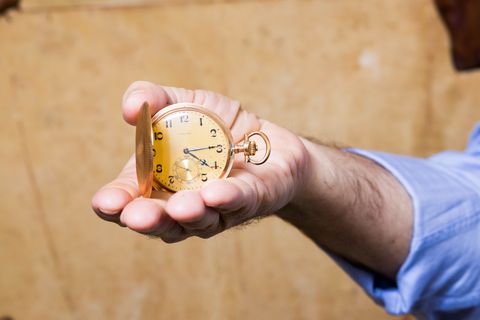How did Eli Hollander become head and CEO of PlanetGroup, which imports luxury brands like Mont Blanc and Radu to Israel? If you ask him, it’s a combination of networking, generosity, and maybe a spark of madness.
Hollander began his career as a general manager of Clal Toys, a section of Clal involved with importing children’s toys. Hollander went on to buy the company with David Federman, one of the owners of Maccabi Tel Aviv basketball team.

In 2000, the partnership between the two ended. Sakal took over the toy brands, but Rado and Sector – brands of Swatch – refused to work with Duty Free importers. Hollander jumped at this opportunity and did what he knows how to do best: he took advantage of his vast network.
“I approached Jackie Bar”, he says. “At the beginning of my career, I was the legal advisor of his company, Tempo, and later became a board member at Israel’s Recycling Union. I offered him to take over the company together and his only condition was that his wife, Rina, would join the business”.
In the early years, Planet evolved as a company. It grew from importing only three brands – Rado, Sector, and Mont Blanc – to a company that imports 15 brands of watches, pens and accessories. The company keeps growing today, with a 3-year consecutive growth rate of 30% per year. In 2003, the company founded a jewelry section, offered in Hamashbir Latzarchacn department stores. Planet even established a high-tech company.
“All of this was managed by your faithful servant”, says Hollander. “In 2008, we closed the stands in Hamashbir because it didn’t go as well as we planned, the high-tech company was sold and it is now active in 70 countries, and even Planet stores are now run by franchises. In 2012, we decided to go back and focus on what we do best: marketing and distributing brands in Israel”.
Taking Over the Planet
Three years ago, Planet acquired the rights to import Lamy, the German brand pens, a giant company with an annual turnover of $150 million in Germany and the East.
“With Lamy, incredible things have happened to me that haven’t happened my entire career”, he says. “I gave lectures to Lamy importers about the trends in the world, and the company’s Vice President was enthusiastic about how he and I could continue working on more projects together. I suggested that he let me manage the brand in Cyprus and Jordan. Two weeks later, the regional manager called me and suggested that I manage the brand in the United States”.
This VP, Steve Birkhold, who happened to be in a job meeting on one of this trips to New York, has over 30 years of experience in the fashion industry and comes with extensive experience in marketing, retail and wholesale, and e-commerce. “Steve used to be the CEO of Nautica, Bebe, Lacoste, Lee Jeans and Diesel – companies whose sales turnover are hundreds of millions of dollars a year”, says Hollander. “What I do is a drop in the sea compared to what he’s done”.
In the brief period since he took up his new position, Hollander has opened Lamy stands in a number of huge stores such as Barnes&Noble and Hudson. Soon, Lamy is set to open up two specialty boutiques in New York and San Francisco. “For me, these pens are strong growth engines. So far, the company has had a $5 million turnover, and I believe that within one year we will double it”.

Hollander’s latest development is a wholesale distribution deal, signed with the Austrian company Swarovski, which manufactures crystal jewelry of unparalleled quality.
“After the failure with Hamashbir Lazarchan, I promised myself that I would never come close to jewelry again. But Swarovski is a different world, a huge company with an annual turnover of 3.5 billion euros, and we have been in contact with them for the past 17 years”.
Luxury with Swarovski
Swarovski wanted to dip their toe in the water and open five stores within the first year, but Hollander had other plans. “When I asked why five stores and not fifty, they explained that every store had to build a display cabinet and they simply couldn’t keep up. So instead, I decided to bring the raw materials from Germany and build the showcases here in Israel, according to the strict standards of Swarovski. This September, the management will come here to see the miracle that has developed here”.
When Hollander talks about grand business decisions, his eyes sparkle. He is obviously proud of his unconventional methods, and he knows that there are those who may raise an eyebrow in light of his impulsive nature. “This summer, to meet sales targets, I went into one of the stores and promised the seller that if he sold 30 Rados, I would fly him to Honolulu. We did a similar operation at the Gentleman Network, and I’m going to fly 30 store managers to Thailand. My employees know I do crazy things. Standard operations just bore me”.
The different floor levels of the buildings in which the company employees work help express Hollander’s generosity and willingness to help others. The second floor of the building is the logistics wing, which Hollander calls “the Mizvot wing”. It employs youths with cerebral palsy several times a week, and its walls are covered with photos from various activities they do together. On the entry level of the building is the “Yair’s House of Gifts”, a storehouse filled with gifts to be donated to to hospitalized children. The idea behind this house of gifts started four years ago, when Hollander’s son, Yair, drowned in the pool in their backyard. Yair was in a state of brain death for nearly an hour, and although the doctors were ready to declare his death, he survived, leaving him with severe brain damage. When Yair was released after a four-month hospitalization, his mother, Meirav, promised to fill Schneider’s Children Hospital’s gift room.
“When we were approached by the hospital telling us that the children’s gift room was empty, Meirav sent the message to several Whatsapp groups and within a week we accumulated 50,000 gifts. We had no place to store them, so we decided to open gift rooms in hospitals across the country. Only recently has Meirav inaugurated a gift room at Assaf Harofeh Hospital. I believe that giving, especially in the same building, brings a blessing to the business”.

The most impressive display in Hollander’s office is a vitrine containing a collection of antique clocks, including a 19th century clock, numerable pocket watches, and a watch that belonged to his grandfather. “One day, I met an acquaintance who asked to purchase a Mont Blanc watch I was wearing. When I refused, he offered to bring me an antique pocket watch instead, and then people started bringing me antique watches as a gift. They thought I was collecting them”, he explains.
Hollander’s fondness for antiques is evident in his two main fields of imports – watches and pens, remnant of an analog world that is slowly disappearing. So how is it that people are still willing to invest such sums in watches and pens?
“92% of the women around the world use a pen on a daily basis, and almost every woman in the world has a pen in her bag, in the car or in the kitchen, and for men the same is true for 78%. Women write more than men, but we all write much less. Everything is digital today, but we pull out a pen when we want to write short notes or long letters. Last week, someone bought two pens for 20,000 shekels. People don’t buy experience pens for the function they fill, but for what it makes them feel. When someone signs a deal with a Mont Blanc fountain pen, all eyes in the room turn to him.”
It is a known fact that brands serve as a status symbol, but Hollander sees a deeper dimension to it all: “We are connected to screens all day, but lately, I see more and more people coming back to the pen. If someone looks at their phone during a meeting, other participants will automatically assume that they are browsing Facebook. No one will give you an awkward glance if you’re writing in a notebook. When you hold something in your hand, it becomes personal. It becomes yours”.
While Hollander admits that analog clocks and pens give way to digital alternatives, he emphasizes that this does not hinder sales, that are actually rising. “The digital world has many drawbacks. You can have thousands of Facebook friends, but most of them don’t know you at all. The book market is also on the rise. People buy products like watches, pens and books not because of the function they fill, but because of the sentiment they evoke. I believe that the next generation will rebel against the digital alienation, and at the end of the day, emotion will overcome functionality”.
Translated by Raz Tal




